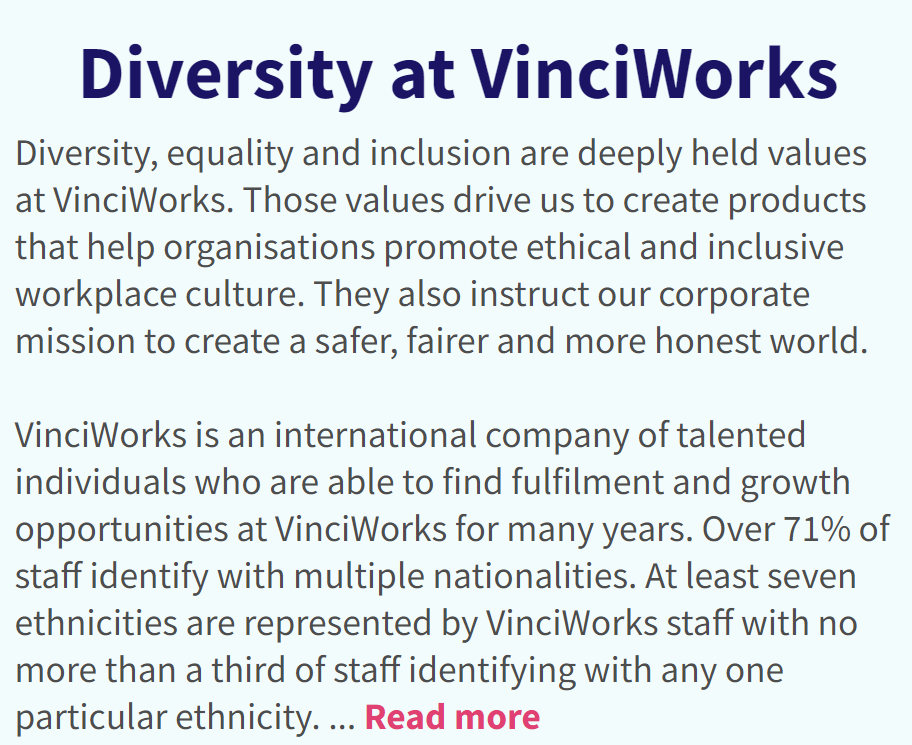Celebrating who we are
Diversity, equality and inclusion are deeply held values at VinciWorks. Those values drive us to create products that help organisations promote ethical and inclusive workplace culture. They also instruct our corporate mission to create a safer, fairer and more honest world.
Our work to provide compliance expertise and promote best practice in the area of ESG often involves the seemingly tricky task of tracking diversity data. Finding out who works in the organisation is the first step to increasing talent and representation. A diverse, representative workforce is not merely about looking the part, it helps the organisation thrive.
Diversity is more than skin colour or sexual orientation; it’s about a diversity of thought, of experience, of talent and skill that drives an organisation forward with new ideas and exciting initiatives. In short, diverse organisations are strong organisations, better able to adapt to the challenges of the modern world.
In January, VinciWorks expanded to include Skill Boosters, a leading e-learning filmmaker with a strong focus on equality, diversity and inclusion training. As 2022 is continuing to demonstrate, ESG is at the top of many companies’ agendas. While VinciWorks has a deep array of training and software solutions to help organisations get started and embed ESG into their operations, we decided it was time for us to do the same.
Over the last month, VinciWorks has undertaken a comprehensive diversity survey of staff across our offices including of our new Skill Boosters brand. We asked anonymous questions using our own ESG survey tools, and built up a fascinating picture of who VinciWorks is as a company. You can find out more about the results of our survey on the updated About Us section of our website, and find out more about conducting your own diversity survey here.
Who we are
VinciWorks is an international company of talented individuals who are able to find fulfilment and growth opportunities at VinciWorks for many years. Over 71% of staff identify with multiple nationalities. At least seven ethnicities are represented by VinciWorks staff with no more than a third of staff identifying with any one particular ethnicity.
VinciWorks has gender parity, with a 50-50 female-male split in the organisation. Eight percent of staff identify as disabled, with two-thirds of those staff limited in their day-to-day activities because of their disability.
VinciWorks is more representative of sexual orientation than the national average. 84% of our staff identify as heterosexual / straight, with VinciWorks proudly employing staff who are gay, lesbian, bisexual and asexual.
We actively seek to strengthen our commitment to inclusion through our hiring practices. We have designed a recruitment process that encourages equity at all stages starting with job advertisements that transparently display the salary and details of our inclusion programme. We train interviewers to ensure that interviews are unbiased and structured, and we work hard to encourage a diverse range of applicants.
VinciWorks supports family and carers with flexible working and a self-managed holiday policy, making it a great place for people to balance work and family. That’s represented in our staff with 63% of VinciWorks staff having children under the age of 18, and 16% having other care responsibilities.
Ensuring inclusion and fairness is a never-ending process and there is still work to be done. We are proud of our progress and we will continue to push our far-reaching goals. As a company, we know that our best work happens when we create a culture at work with diverse representation and where everyone feels that they belong.





